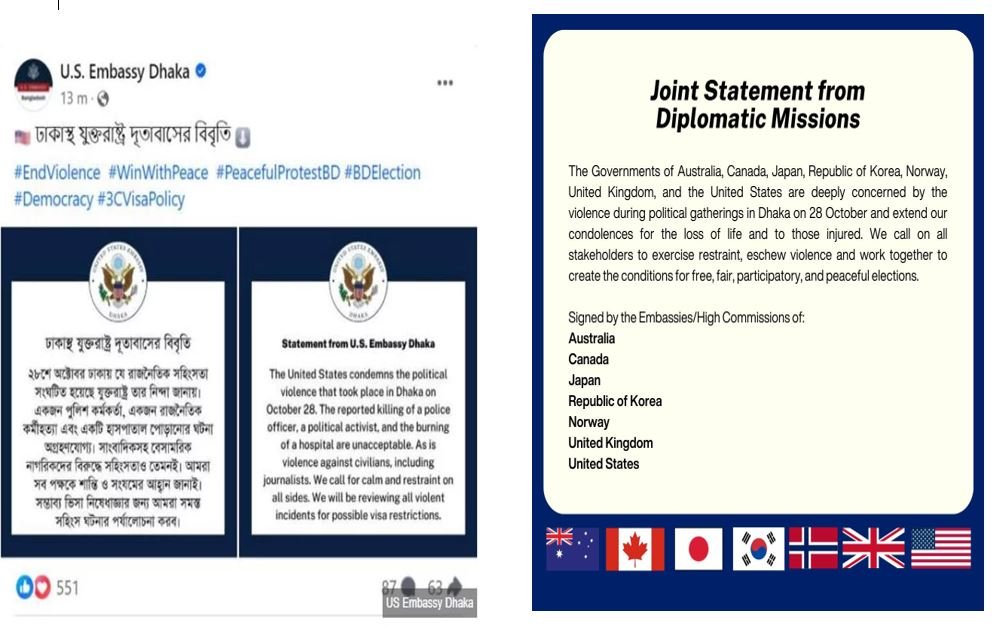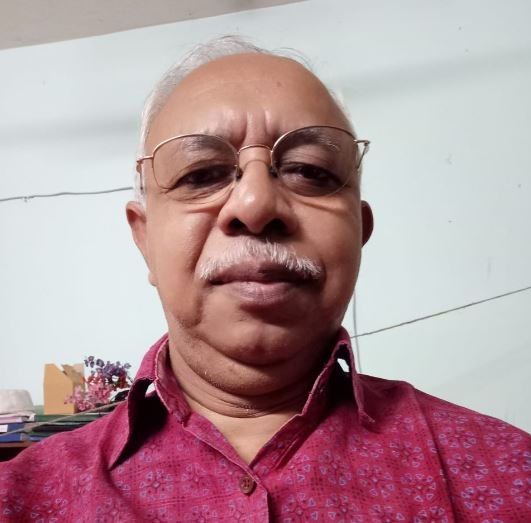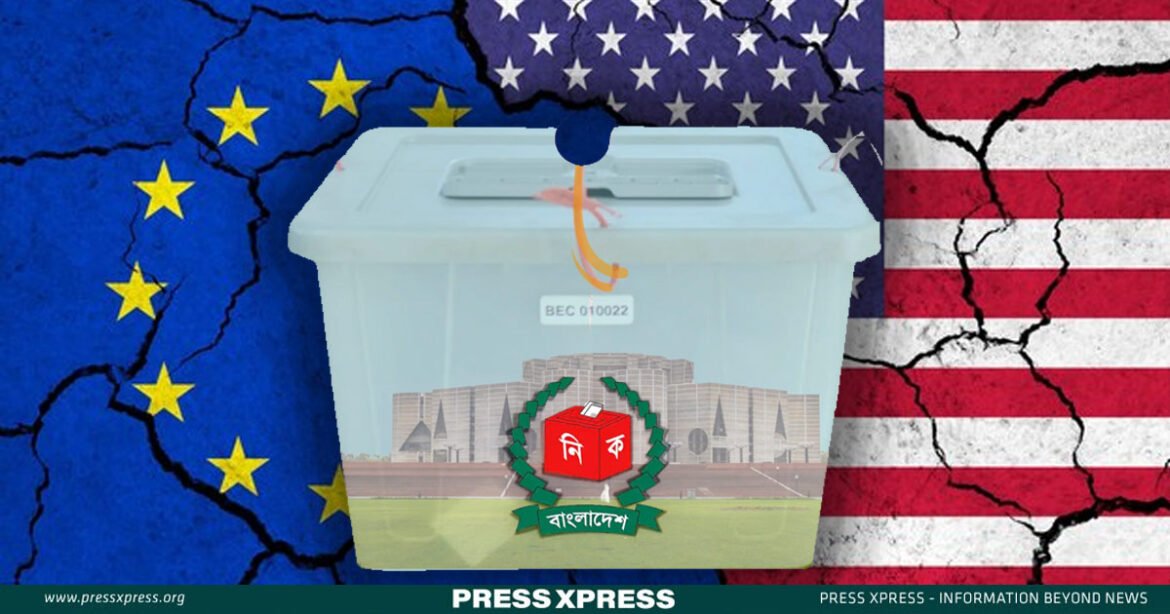As Bangladesh’s 12th general election comes closer and the USA proactively trying to exert influence on the country’s internal matter, European countries refused to follow the USA’s directives here blindly.
Bangladesh is not now a weak man to become foreigners’ playground rather, over the years, the country emerged as the crucial global partner under the leadership of its Prime Minister Sheikh Hasina.
You can also read: No External Influences in Pursuit of Free and Fair Election
Opposing the USA’s undiplomatic rhetoric in Bangladesh, other global powers including China, Russia and India vowed not to interfere in Bangladesh’ politics and to respect people’s right to choose their leadership.
The division emerges among Western countries after October 28 this year when the USA promptly issued statement but it took two days to agree on the language of a joint statement by seven nations, including the US and other six EU countries, hinting at disagreement among the nations.
In the joint statement, the seven countries advocated for creating a conducive electoral environment in Bangladesh. But the USA separately criticized events centering the BNP’s rally on October 28 and hint at potential VISA ban.

Earlier on July 19, 13 western countries including the USA, and EU condemned the assault on Hero Alom, an independent candidate for by-elections in the Dhaka-17, but it took two days too to agree on the statement’s language.
However, the two aforementioned statement was soft as the EU countries declined to adopt harsher words against Bangladesh.
In the Labor rights approach to Bangladesh, the U.S. linked it to their national security and threatened sanctions. The EU takes a distinct stance, affirming ongoing progress in labor rights implementation in Bangladesh and maintaining a cooperative relationship until 2032.
Charles Whiteley, the EU ambassador, emphasizes cooperation with Bangladesh until 2032 to address labor rights issues in the EU market. The EU maintains an independent expert team in Bangladesh to assess electoral issues.
France, Germany, the United Kingdom, Canada, Italy, Norway, Netherlands, Switzerland, and Japan each have unique visions, strategic goals, and priorities regarding Bangladesh. Despite alignment on various global issues, the United States finds itself different on the Bangladesh election and labor rights matter.
Anticipation of sanctions against the Rapid Action Battalion (RAB) following the US’s move in 2021 did not materialize among Western countries, revealing a complex web of diplomatic relationships. Economic interests, such as the Airbus agreement with France, influence the stance of certain Western nations, highlighting the multifaceted nature of international relations. In this context, The EU takes a distinct approach to labor rights, with ongoing progress noted during the EU GSP review team’s recent visit.
Wishing anonymity, an EU diplomat recently told a Bangladeshi media outlet that the USA take decisions on their geopolitical reality and the EU on their priority basis. If the two scenarios align, then the USA and the EU can take shared decision otherwise not.
This statement hints that the EU is no longer follow blindly what the USA does anywhere.
The Question of Jamaat-e-Islami
The rift widens further on the question of Jamaat-e-Islami Bangladesh.
Radical religious outfit Jamaat remains the key Islamic fundamentalist party in Bangladesh. But it maintains an interesting relationship with the US.
At one point in time, Jamaat was even promoted as a moderate Islamic party.
In a confidential note, as revealed by Wikileaks, the US Embassy in Dhaka in January 2010 wrote, “Mission Dhaka will continue to engage with Jamaat and Shibir [Islami Chhatra Shibir] and track their efforts to transform Bangladesh into a more Islamic state.”
On July 24, the US ambassador met with the main party functionaries of Jamaat.
The US State Department in its ‘2022 Country Reports on Human Rights Practices: Bangladesh’ statement showed its love for the notorious Jamaat, saying, “Leaders and members of Jamaat-e-Islami (Jamaat), the largest Muslim political party in the country, could not exercise their constitutional freedoms of speech and assembly because of harassment by law enforcement authorities.”
The position of the European Union is apparently different from that of the United States. A resolution adopted by the European Parliament in 2023 called on “the BNP to maintain clear distance from Jamaat-e-Islami”. But despite the EU’s warning, Jamaat’s affinity with BNP is clear in anti-election activities.
US alone is ‘crying wolf’
The USA has been showing great interest for the past few months ahead of the elections. At least 15 USA’s high officials’ visit in Bangladesh in 2023 proved the USA’s dedicated efforts centering the polls.
The country also announced to impose VISA restriction on Bangladeshi individuals and frequently mention Bangladesh’s election in their foreign policy briefing.
The US ambassador in Dhaka, Peter Haas, has been proactive like activist to assert influence regarding the polls.
This level of dedication raises eyebrows about the USA’s motive and interest.
But the EU seems not that much active like the USA. The EU has said that the Election Commission (EC) will do their works.
In a significant diplomatic move, India recently unequivocally extended its support towards the democratic advancement in Bangladesh during a high-level ‘2+2’ Ministerial Dialogue with the United States.
One of the main participants in the discussions, Indian Foreign Secretary Vinay Mohan Kwatra, underlined India’s unwavering support for democratic movements in Bangladesh.
Kwatra said, “It is not our (India) space to comment on the policy of a third country. When it comes to developments in Bangladesh, elections in Bangladesh… it is their internal matter and it is for the people of Bangladesh to decide their future.”
Indian High Commissioner to Dhaka, Pranay Verma on December 14said, “Bangladesh holds the top position in India’s priority list among neighboring countries. India is committed to supporting Bangladesh in its development efforts.”
This demonstrates India’s regard for Bangladesh’s sovereignty, and it reflects the attitude of a friendly ally rather than an external influencer.
Recently, Canada’s Member of Parliament Chandra Arya’s hailed Bangladesh’s development journey.
MP Chandra said, “Bangladesh has experienced substantial economic growth over the past few years, characterized by stability and certainty.”
Russia and China opposed USA’s efforts to interfere in Bangladesh’s politics.
Russian Foreign Ministry Spokesperson Maria Zakharova has accused US Ambassador in Dhaka Peter Haas of aiding the opposition parties to hold anti-government protests in Bangladesh.
“At the end of October, US Ambassador to Bangladesh Peter Haas met with a member of the local opposition to discuss plans for organizing anti-government rallies,” Zakharova told a media briefing in Moscow, Russia, on November 22.
Chinese Ambassador Yao Wen also expressed optimism about Bangladesh’s future being shaped by its own people. He underscored China’s unwavering commitment to non-intervention and conveyed a keen interest in maintaining cooperation and stability following the upcoming election.
On November 15th, Japan signed an US$3.82 million deal in which Japan will provide patrol boats and coastal radar for Bangladesh’s military. The deal falls under Japan’s official Security Assistance Program.
On September 11, French President Emmanuel Macron Visited Bangladesh. During his meeting with Prime Minister Sheikh Hasina, he was quoted saying, “Based on democratic principles and the rule of law, in a region facing new imperialism, we want to propose a third way – with no intention to bully our partners or to lead them to an unsustainable scheme,”. His statement indicates France’s indication that it respects Bangladesh’s internal affairs and continued strong diplomatic ties.
Analyzing these all scenario, one could say that USA’s allies are no longer follow the USA as Bangladesh emerged as a strong player in the global stage and it’s too risky to ignore it. .
Chittagong University Professor Bhuian Md Monoar Kabir told Press Xpress that the EU denied to blindly follow the USA’s decision on Bangladesh.
According to him the reasons may be twofold:
a. The EU has a greater economic interaction with Bangladesh. They can’t afford many of the things that the US can.
b. EU has always been the spoilers. They reap the fruit of America’s efforts. Furthermore, they still look Bangladesh through India’s eyes and deep distaste from the BNP.

Awami League general secretary Obaidul Quader on December 7 said, ‘America alone could not impose any hard decision on Bangladesh as the country’s friends in Asia and the Indo-Pacific region are not echoing the same,’


